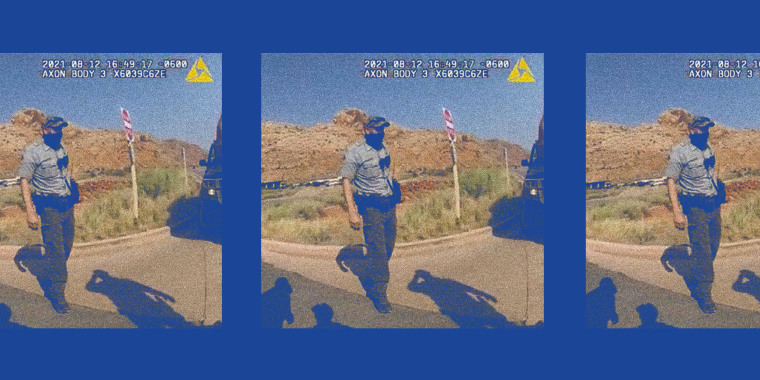The death of Gabby Petito, which has been ruled a homicide, has focused discussions on a range of issues, from “missing white woman syndrome” to federal laws against unauthorized debit card use to the contemporary phenomenon of crowdsourced crime solving. There’s another topic signaling for attention, just as it did Aug. 12, when a police officer engaged with Petito and her fiancé, Brian Laundrie, after someone witnessed a physical altercation between the two. This issue is intimate partner violence, and the disparity across states in the laws governing how police respond to such cases.
This column isn’t about whether the police officer did the right thing or not.
On Thursday, we learned that the Moab City Police Department will launch a review of how it handled its encounter with Petito and Laundrie, wherein their officer decided to not arrest either party. The department will wisely ask another law enforcement agency to conduct the review.
Equipped with reporting from a citizen witness, statements from Petito and Laundrie, and his own observations of the couple, which included marks on Laundrie's face that Petito and Laundrie both conceded were from Petito striking Laundrie, the officer determined that the best course of action was to ask the two to spend the night apart. The roadside car stop — including the officer’s explanation of his understanding of applicable law — was captured on police body camera.
This column isn’t about whether the police officer did the right thing or not. In fact, his actions, given the specifics of this scenario, may have been consistent with Utah law, as the state law mandates domestic violence arrests only when there is evidence of serious bodily injury, or that a dangerous weapon was used, or that there will be “continued violence.”
Likely, it was the officer’s attempt to mitigate “continued violence” that led him to request that one of the couple spend the night alone in a hotel. Of course, we now know that about two weeks later, the couple reportedly had an emotionally charged dispute in a Jackson Hole, Wyoming, restaurant.
Utah’s law is different from other state laws, even in neighboring states, which differ from still other states. Some states don’t ever mandate arrest at all, and leave the decision to officer discretion. In fact, if Petito and Laundrie's physical altercation had happened just 50 miles down the road in Colorado, a police officer there, finding the same probable cause as his colleague in Utah, would have had to arrest Petito for striking Laundrie, regardless of the severity of Laundrie injury.
We can’t even agree on a common definition of domestic or intimate partner violence in the United States.
It’s not just that pertinent laws differ across the country; we can’t even agree on a common definition of domestic or intimate partner violence in the United States — even though the Centers for Disease Control and Prevention offer a suggested definition. And, while the federal government does have applicable laws when there is a clear federal nexus, such as on tribal reservations or in cases of interstate stalking, we don’t have a unified approach that would eliminate the existing differences among states that either “encourage” an officer to make an arrest, claim an officer “may” arrest, and/or mandate that an officer “must” arrest - and under what circumstances.
The tragic irony here is that if Petito were arrested and detained for hitting Laundrie, it’s possible — though by no means guaranteed — that she might still be alive today. It’s also possible that mandated arrest policies can exacerbate the risk of violence to one or both parties. Or perhaps enhanced training for the responding Moab City police officer, or consultation with a domestic violence counselor, might have highlighted certain signs that Petito was at risk.
While I have no way of knowing how different the outcome would have been, I do know that outcomes as serious as living or dying at the hands of a domestic partner shouldn’t depend on what state you live in.
It’s time to rethink our approach to domestic partner violence laws, to include police training and community services alliances, mandated actions to further safeguard victims and survivors, consistent legal definitions, and standardized law enforcement response. The current stove-piped, disjointed approach isn’t serving us well. And in many cases, it may be contributing to yet another tragedy.

